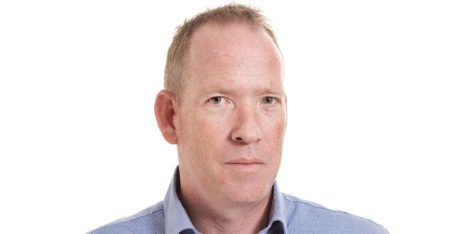
The aggressive selloff in EOH shares continued on Friday morning, with the counter shedding another 41% to reach lows last seen six years ago, well below R30/share. Friday morning’s plunge follows a 34.7% decline on Thursday and an 11% decline on Wednesday.
It has lost about two-thirds of its value this week, wiping out billions of rand in shareholder value. Since January, the share price has declined by more than 80%. On Friday, it touched a low of R26.55; at the beginning of the year it was trading above R160. The share rebounded in afternoon trading, though, to close the session 5.6% higher at R47.52 — a remarkable reversal of fortunes.
The slump in recent days is likely in part related to Independent Police Investigative Directorate (Ipid) raids this week to do with alleged corruption at the South African Police Service. Analysts have also blamed contagion related to the accounting scandal by furniture retailer Steinhoff, with investors selling off equities that are perceived to have high risk.
An attempt on Thursday evening by EOH to settle investor anxiety by issuing a statement on the JSE’s stock exchange news service failed.
The “voluntary” statement said EOH “remains committed to its purpose of being an ethical and relevant force for good in society, ensuring that all our business is conducted with integrity, transparency and the highest moral standards”.
“EOH would therefore like to reassure the market that the business remains strong, with a great leadership team and strong fundamentals,” it said.
However, it added that it had reached agreement with the former shareholders of Grid Control Technologies, Forensic Data Analysts (FDA) and Investigative Software Solutions to unwind a 2015 deal to acquire them, with unwinding effective from 31 October 2017. It did not say why it reversed the deal or the financial impact of doing so, though a source said the companies had failed to achieve agreed earnings targets.
The Daily Maverick reported on Wednesday that Ipid’s head of investigations told parliament’s standing committee on public accounts that there had been a “clear manipulation of the procurement system” in favour of FDA, a company led by controversial businessman Keith Keating. The Ipid official reportedly said there was a corrupt relationship between FDA and the police service.
Earnings multiple
EOH’s trailing price-to-earnings multiple fell to just 3.6 on Friday, despite reporting a 16% increase in headline earnings per share for the year ended 31 July 2017. At that level, the market is pricing in an earnings disaster, which management in its statement suggested was not going to happen.
“The breadth of our offerings, the depth of the skills of our people and the diversity across the group are our greatest assets, and provide the group with a high degree of resilience,” it said in the statement to shareholders.
The share price has come under considerable selling pressure this year, even before this week’s rout, following the resignation of founding CEO Asher Bohbot, a report by investigative reporting team amaBhungane that implicated the company in dodgy dealings involving welfare agency Sassa (it later said it had been cleared of any wrongdoing) and financial results that showed its earnings growth slowing (though still relatively robust).
Troublingly, EOH director Jehan Mackay — who heads the group’s public sector business unit — has aggressively been selling shares in the past two weeks.
EOH declared on Thursday, after markets closed, that Mackay had sold shares worth R6m on 1 December. He offloaded 75 000 shares through a family trust at an average price of R80.50/share. On 24 November, he sold R6.2m worth of shares at R82.68/share. — (c) 2017 NewsCentral Media




